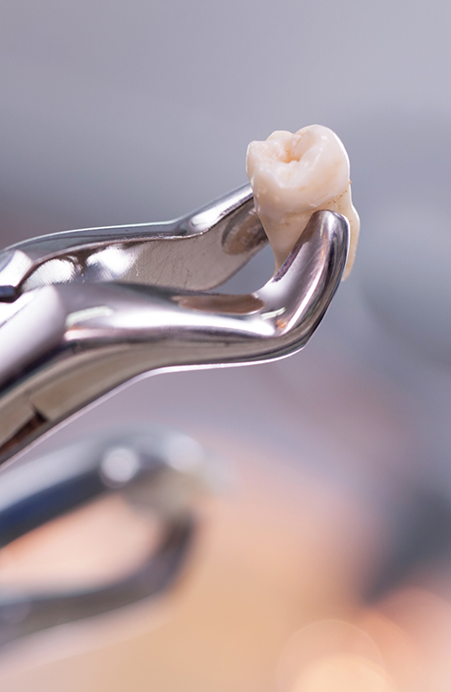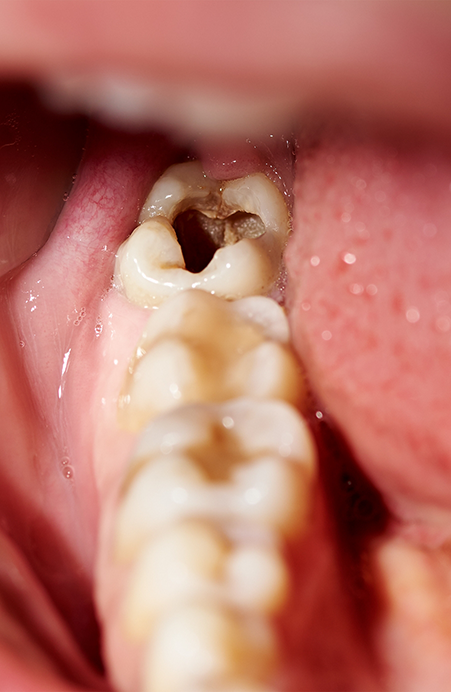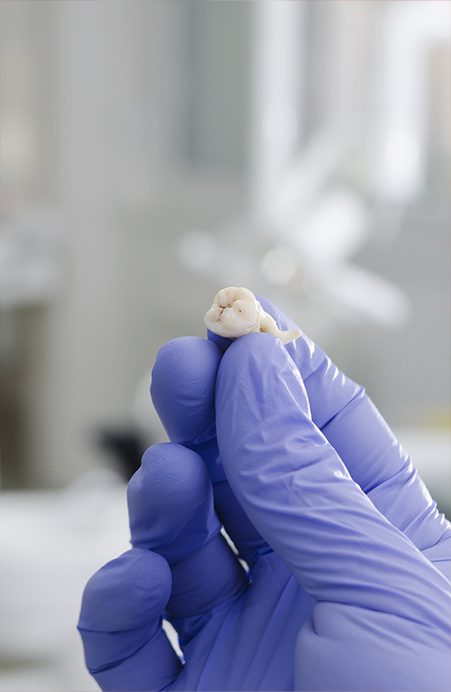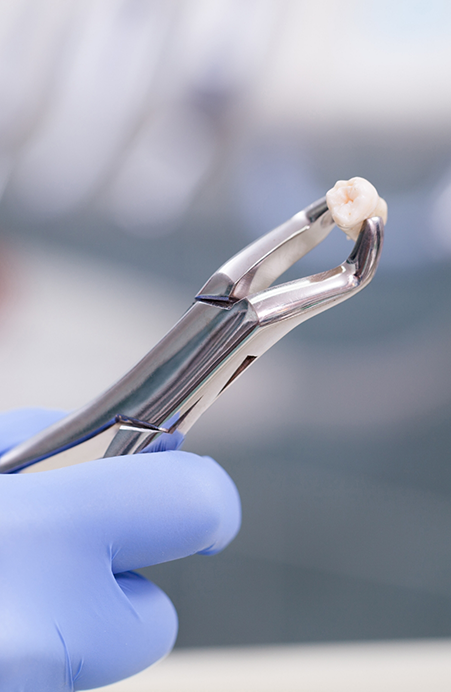Tooth Extractions Greensboro
Removing One Tooth and Protecting the Rest

A tooth extraction is never Dr. Fisher’s first choice, but when the procedure needs to be done, he’ll make sure to use an appropriate form of sedation and gentle dental techniques so that you won’t have to worry about discomfort or complications during the procedure. Teeth can be removed for a few different reasons, such as irreparable damage or severe infections. Give us a call if you’re experiencing constant dental pain and are looking for a solution.
Why Choose Dr. David M. Fisher, Jr. for Tooth Extractions?
- Calming Environment
- Friendly Dentist and Experienced Team
- High-Quality Clinical Care
Reasons Why Tooth Extractions Are Necessary

Root canals and dental crowns are often used to save teeth that have become infected or damaged. This way, the healthy tooth structure can be saved. However, in some situations, it can be better for your long-term health and well-being to extract a tooth. Here are some of the reasons why you may need to have a tooth removed:
- You have a tooth that is severely damaged or decayed and cannot be repaired
- To allow for orthodontic treatment and maintain the results
- To ensure long-term success with a restoration, like a full or partial denture
- When a baby tooth won’t fall out on its own
- When a tooth is impacted and unable to erupt properly
The Process of Removing a Tooth

When a tooth that needs to be extracted has fully emerged from the gums, we can perform a non-surgical extraction. After numbing the area completely with reliable anesthetics, we will use a clasping tool to shift the tooth around until it breaks away from the gumline. If a tooth has not fully emerged from the gumline, pulling isn’t usually a possibility. In this case, you will need to have your tooth surgically removed. During this procedure, a small incision will be made into your gums to allow us to reach enough of your tooth and remove it.
When you see us for a consultation, you can find out which type of extraction is ideal for your individual situation. This will also be the time to discuss possible tooth replacement options after your extraction. This way, you can avoid long-term dental issues caused by tooth loss.
Tooth Extraction Aftercare

Before you’re able to head home, we will give you specific aftercare instructions to help you recover comfortably and efficiently. Everyone is different, but here are some of the steps that we typically recommend for optimal recovery:
- Take all recommended over-the-counter and prescribed medications as directed
- Avoid using tobacco products until your mouth has completely healed
- Do not use a straw to drink beverages
- When sleeping, prop up your head on pillows
- Get plenty of quality sleep
- Apply a cold compress or ice pack to reduce swelling and discomfort
- Avoid hard, crunchy, and sticky foods
Understanding the Cost of Tooth Extractions

Has your dentist recommended pulling out one of your pearly whites? Are you wondering about the overall cost of your tooth extraction? You may not expect a set price for your treatment, as every patient’s smile is different, but we can provide you with a precise estimate after an initial consultation. We’ll assess your situation and determine how best to approach your procedure as well as how much you’ll have to pay. Our team will also walk you through your financing options to help make your treatment more manageable. Read on to learn more about the cost of tooth extractions in Greensboro.
Factors That Can Affect Tooth Extraction Cost

Since the price of pulling a tooth can vary greatly between patients, we’ll need to examine your oral situation first and foremost. Once we’ve had a chance to evaluate your tooth, we’ll discuss the factors that can impact the cost of the procedure, such as:
- The number of teeth needing to be extracted
- The size and shape of the tooth that needs to be pulled
- The location of the tooth in the mouth
- The cost of tooth-replacement options, like a dental bridge or implants
Does Dental Insurance Cover Tooth Extractions?

While every dental insurance policy is different from person to person, most providers will offer coverage that is split into various categories of treatments. Since tooth extraction is considered an essential healthcare procedure, you might likely receive around 50% coverage of the total cost of the service.
That said, your plan may include certain stipulations, such as the number of teeth that can be covered in a specific timeframe, a waiting period, or if your benefits only start after you’ve met your deductible. That’s why you’ll want to verify the details of your policy with your company before starting any treatment. You can also speak with our knowledgeable team should you need help navigating your plan and making the most of your benefits.
How To Make Tooth Extractions Affordable

If dental insurance isn’t in the cards for you, then you might consider exploring alternative financing options. Our team is happy to help you make your procedure more affordable, as tooth extraction can be a viable solution to save your oral health. That’s why we offer plans through CareCredit that can break up the cost of your procedure into monthly installments with little to no interest! You’ll be able to receive your necessary treatment stress-free and without having to break the bank.
Tooth Extraction FAQs
Do Tooth Extractions Hurt?
If you’ve ever heard the expression “It’s like pulling teeth” then you may be concerned about how painful your tooth extraction is going to be. Thankfully, you have nothing to worry about! We use the latest techniques to remove teeth, plus we will completely numb your mouth with a reliable local anesthetic to ensure your comfort. If you are particularly nervous, uncomfortable, or sensitive, we also offer nitrous oxide sedation to help patients feel relaxed, at ease, and comfortable throughout the procedure.
Do I Need to Replace a Tooth That Has Been Extracted?
Unfortunately, while extracting a tooth solves some problems, it creates others. Neighboring teeth will begin to shift into the space, causing a cascade of crooked teeth. Your risk of oral health issues like cavities and gum disease goes up, and your jawbone will gradually begin to deteriorate where the missing tooth’s roots once were. That’s why we highly recommend replacing a tooth once it has been extracted. We will be happy to go over all our tooth replacement services before your extraction so you can keep your smile full and healthy.
What Can I Do to Speed Up Healing After a Tooth Extraction?
Recovering from a tooth extraction will undoubtedly take time, but there are a few things you can do to speed up healing. First, make sure to get plenty of rest, avoid strenuous activity, and keep your head elevated. This will keep your blood pressure low and help the blood clot that’s formed over the empty socket in place. You should also avoid acidic things (mouthwash, juice, sour foods) to prevent irritating the extraction site and drink plenty of water to keep the area clear of bacteria. If you have questions or concerns about healing from your tooth extraction, don’t hesitate to reach out to us.
Why Does My Tooth Need to Be Extracted If It Doesn’t Hurt?
While a tooth that needs to be extracted will usually be quite painful, that’s not always the case. Sometimes, you may not feel the problematic tooth at all! However, just because you can’t feel it doesn’t mean it’s not a threat to your other teeth. A tooth may go numb if it has been badly injured in an accident or if an infection goes untreated. Then, even though the tooth doesn’t hurt, it’s still collecting dangerous bacteria that can attack your other teeth. We only recommend a tooth extraction when it’s absolutely necessary, so please don’t hesitate to ask us any questions if you need more clarification!

